Charles E W Bean, Diaries, AWM38 3DRL 606/274B/1 - 1918 - 1939 - Part 5
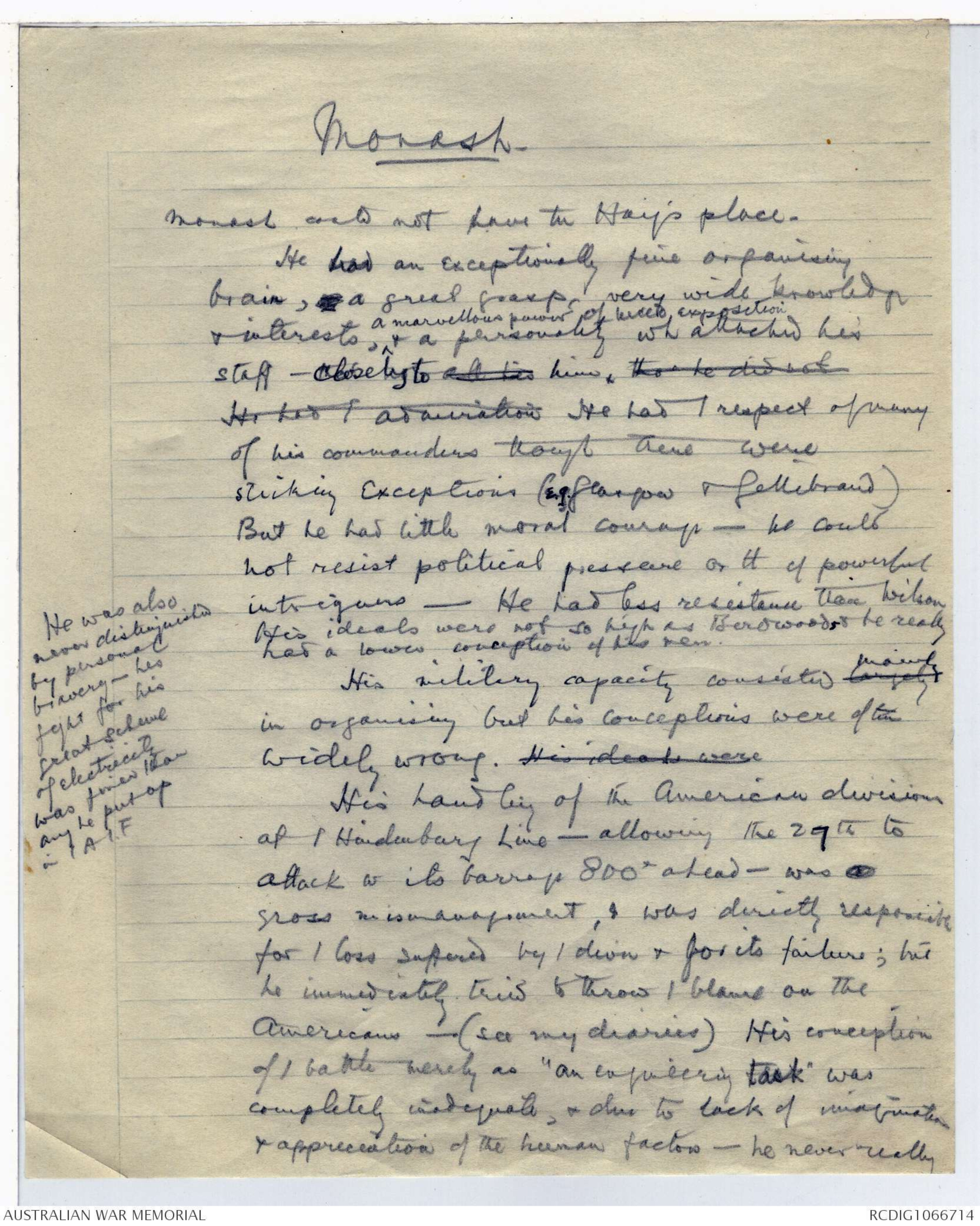
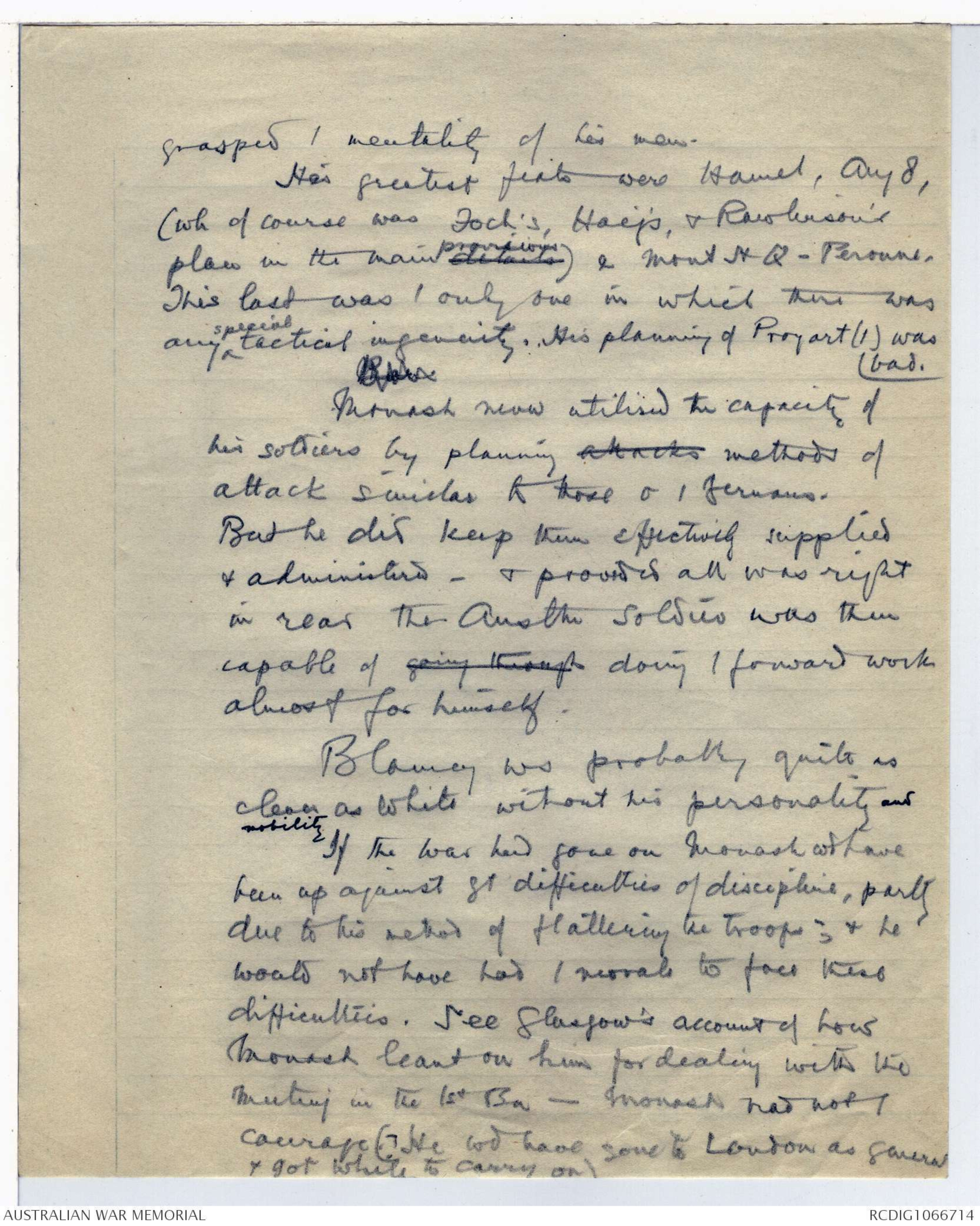
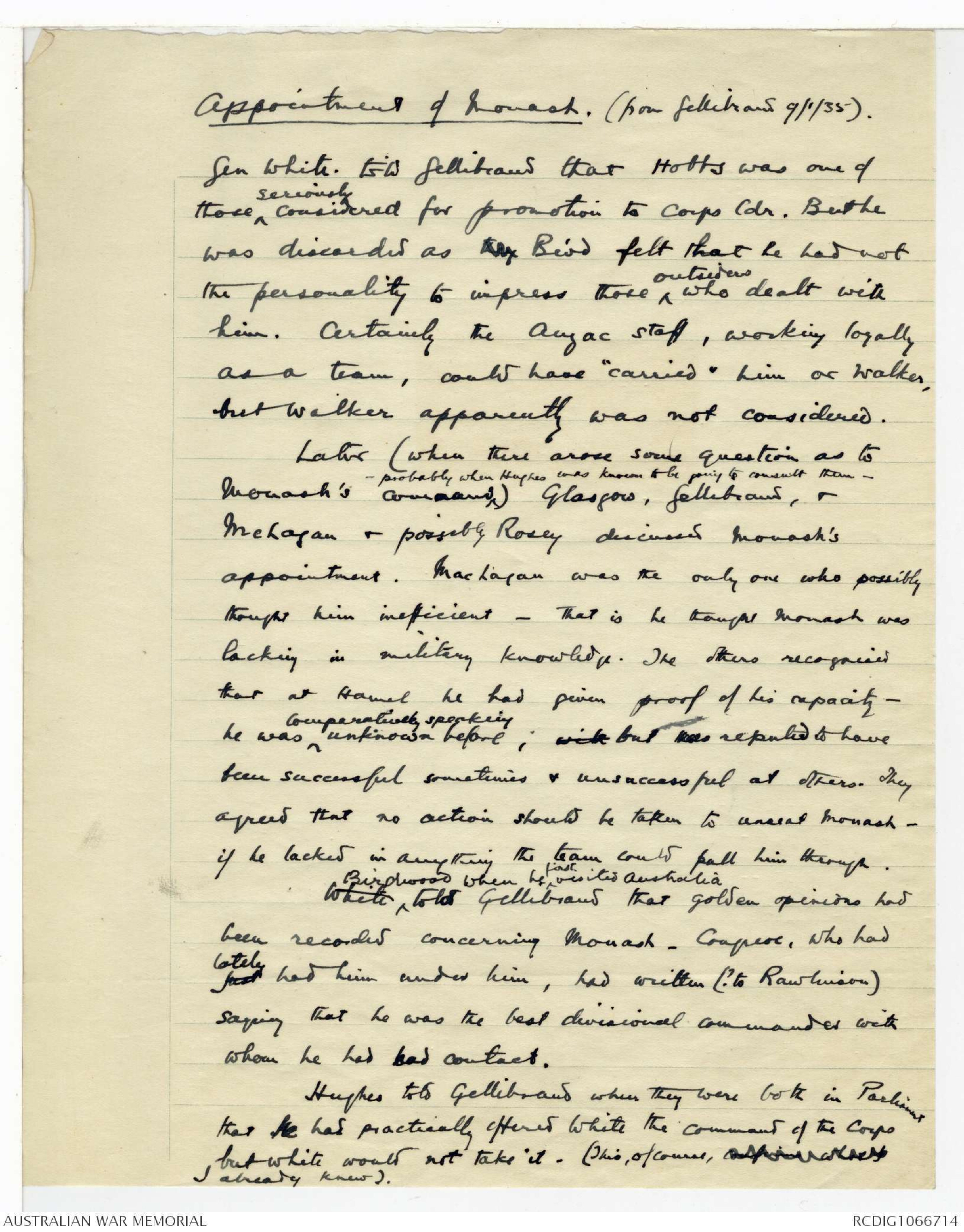
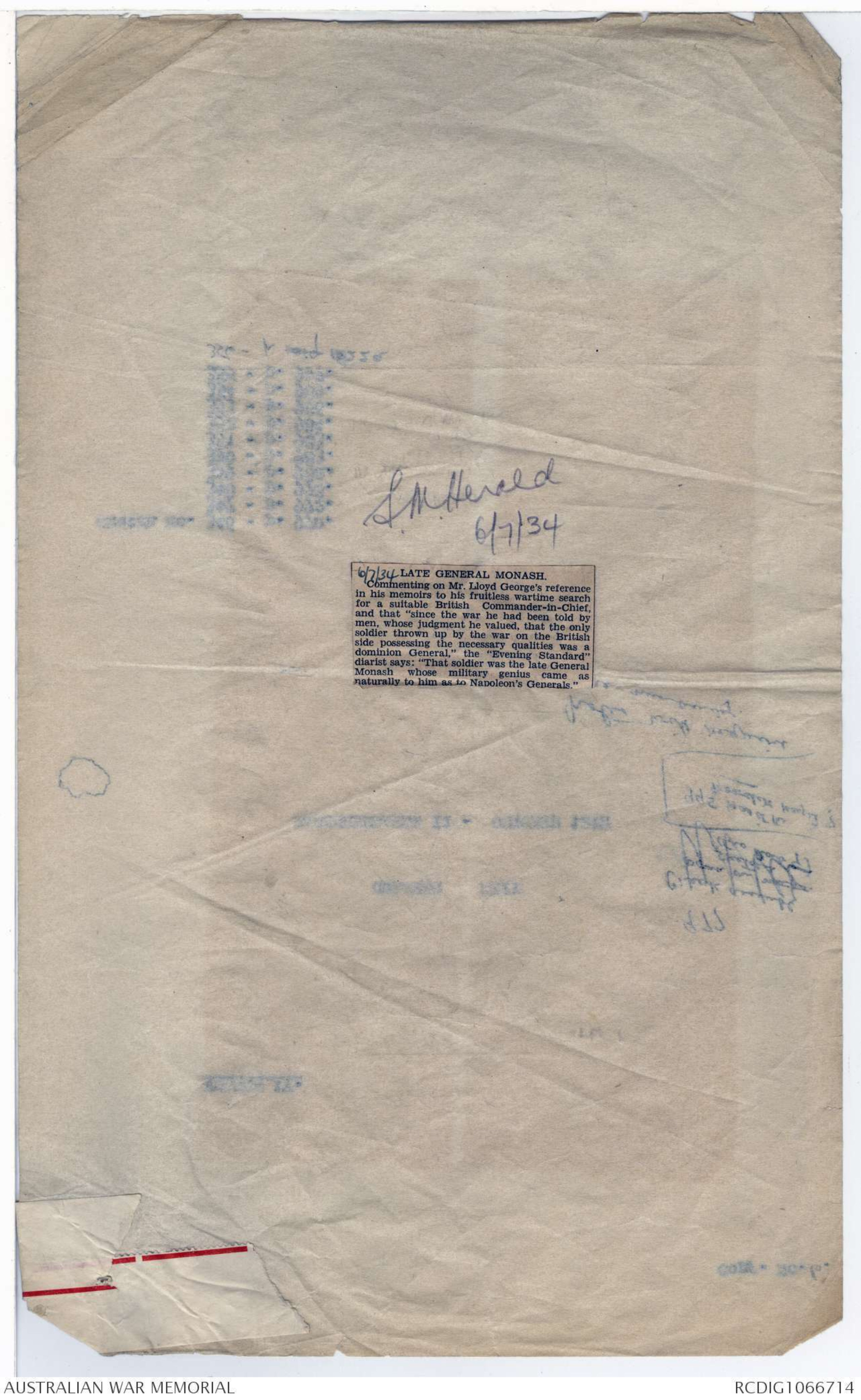
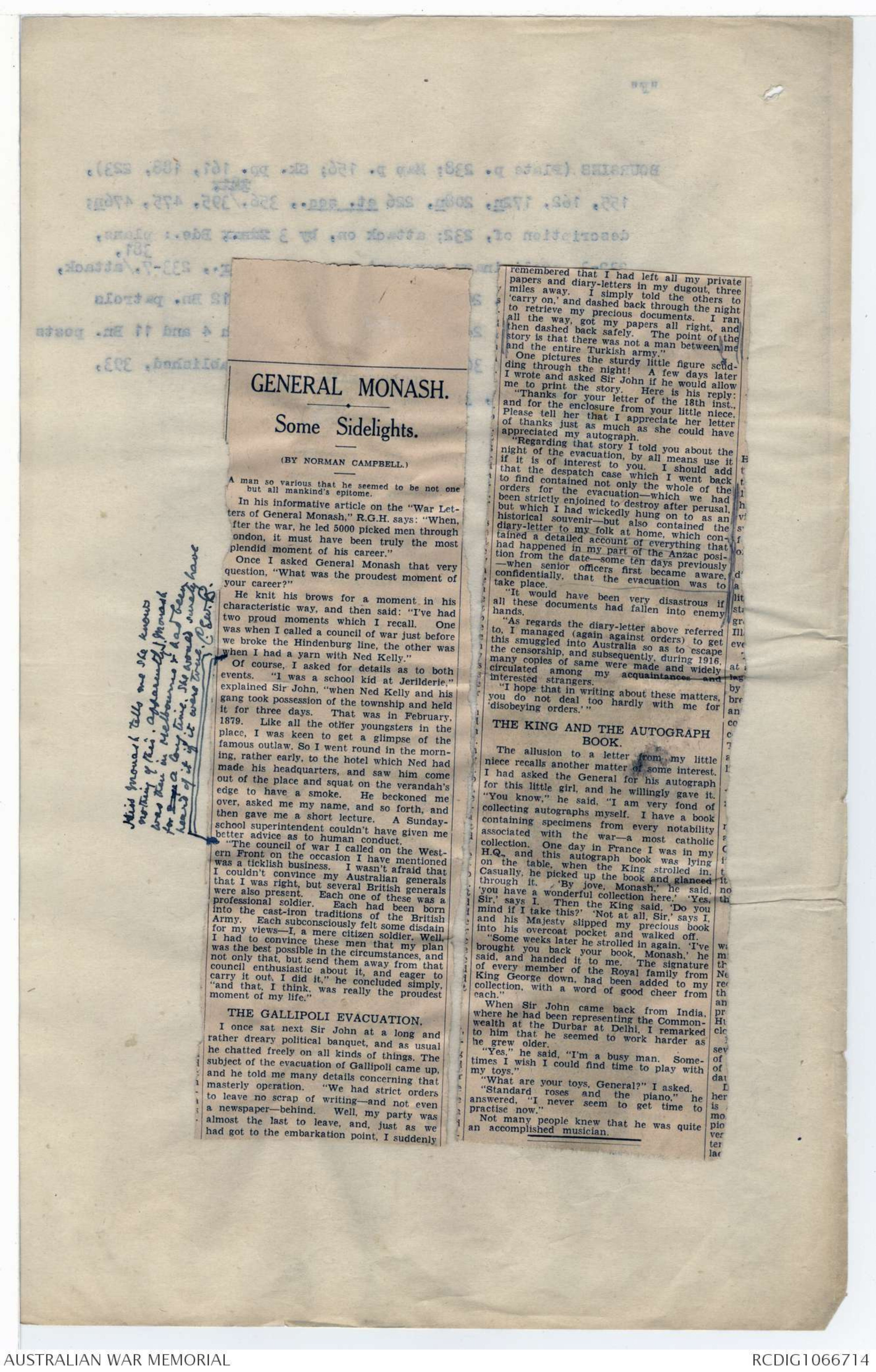
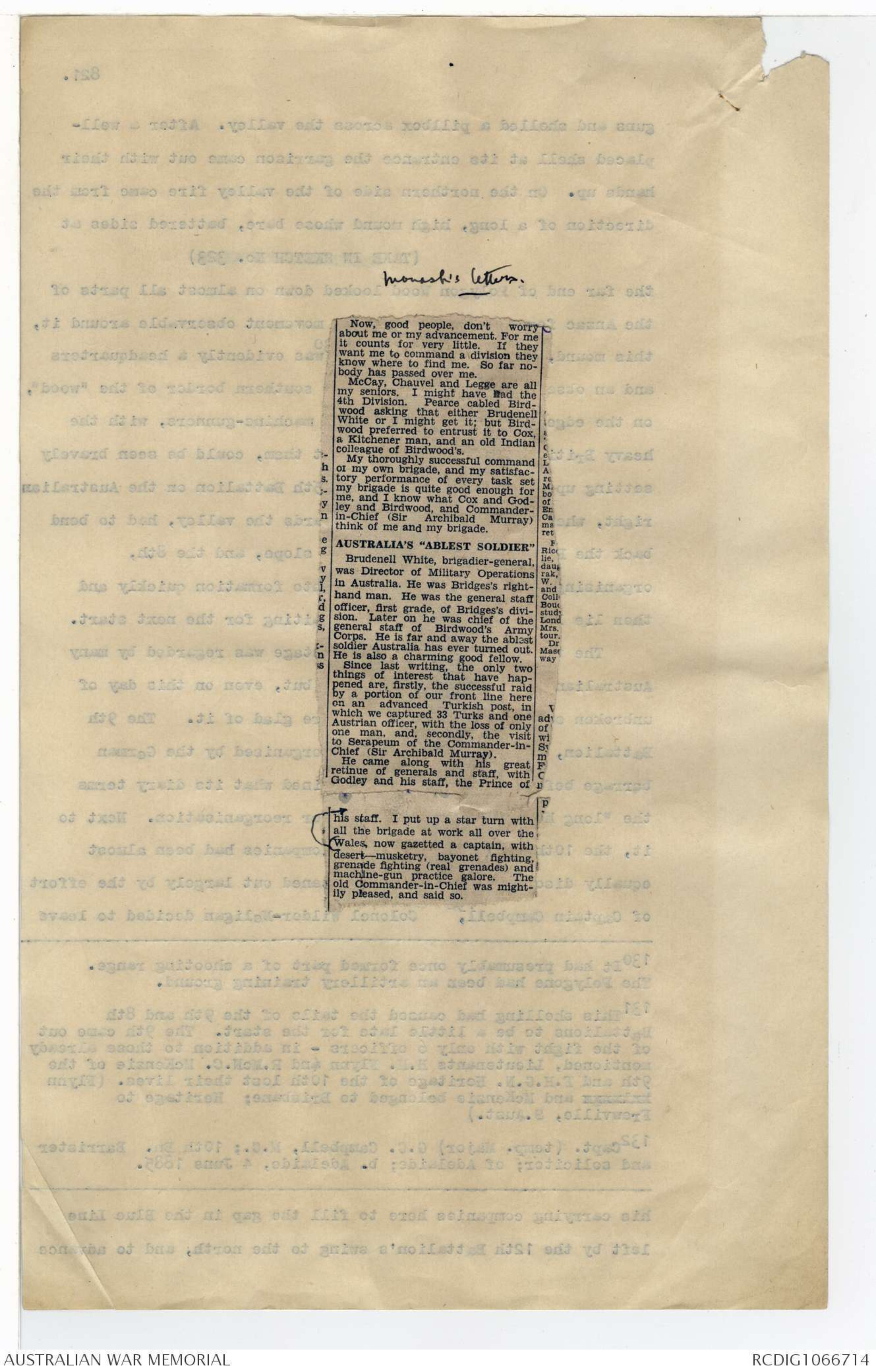
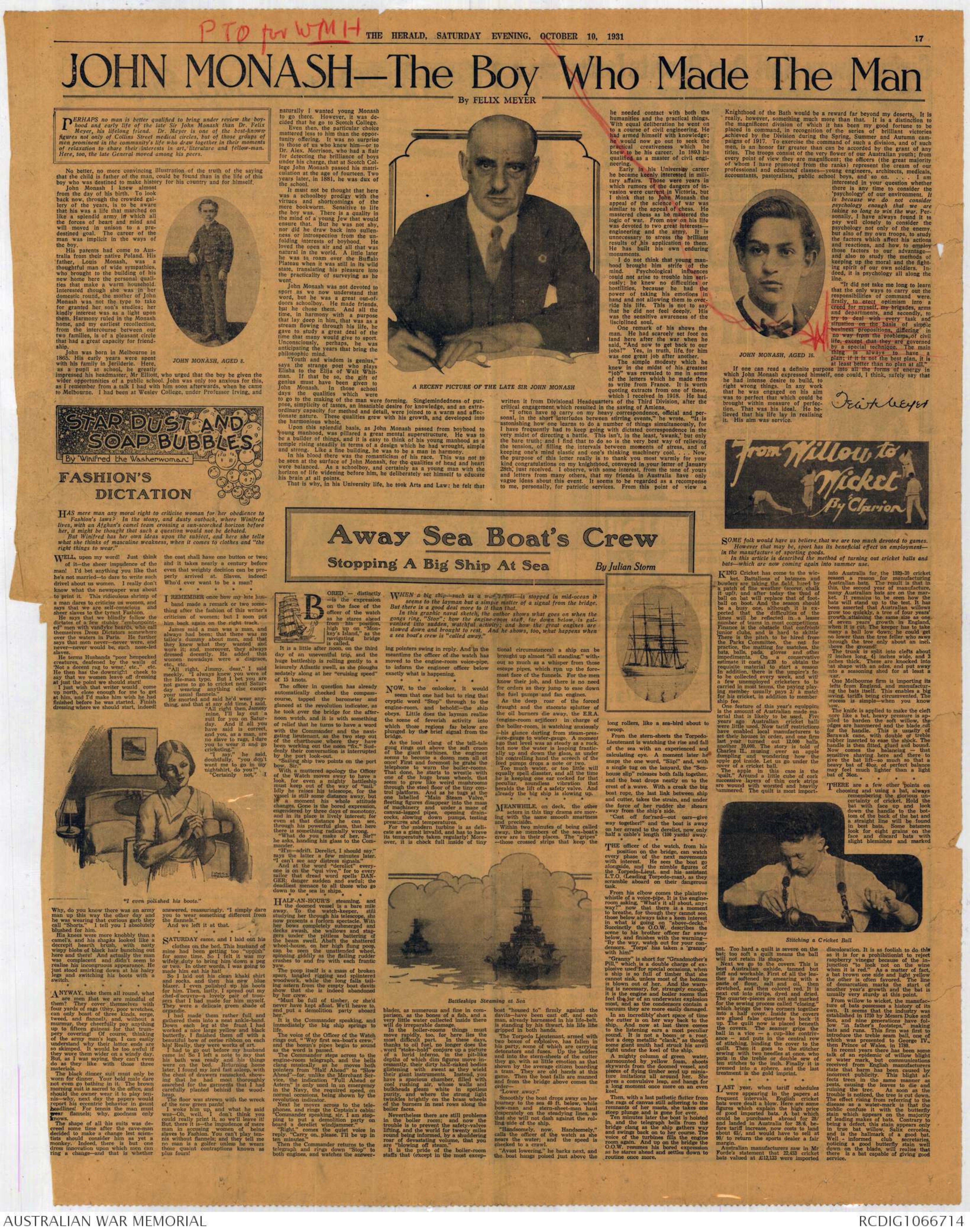
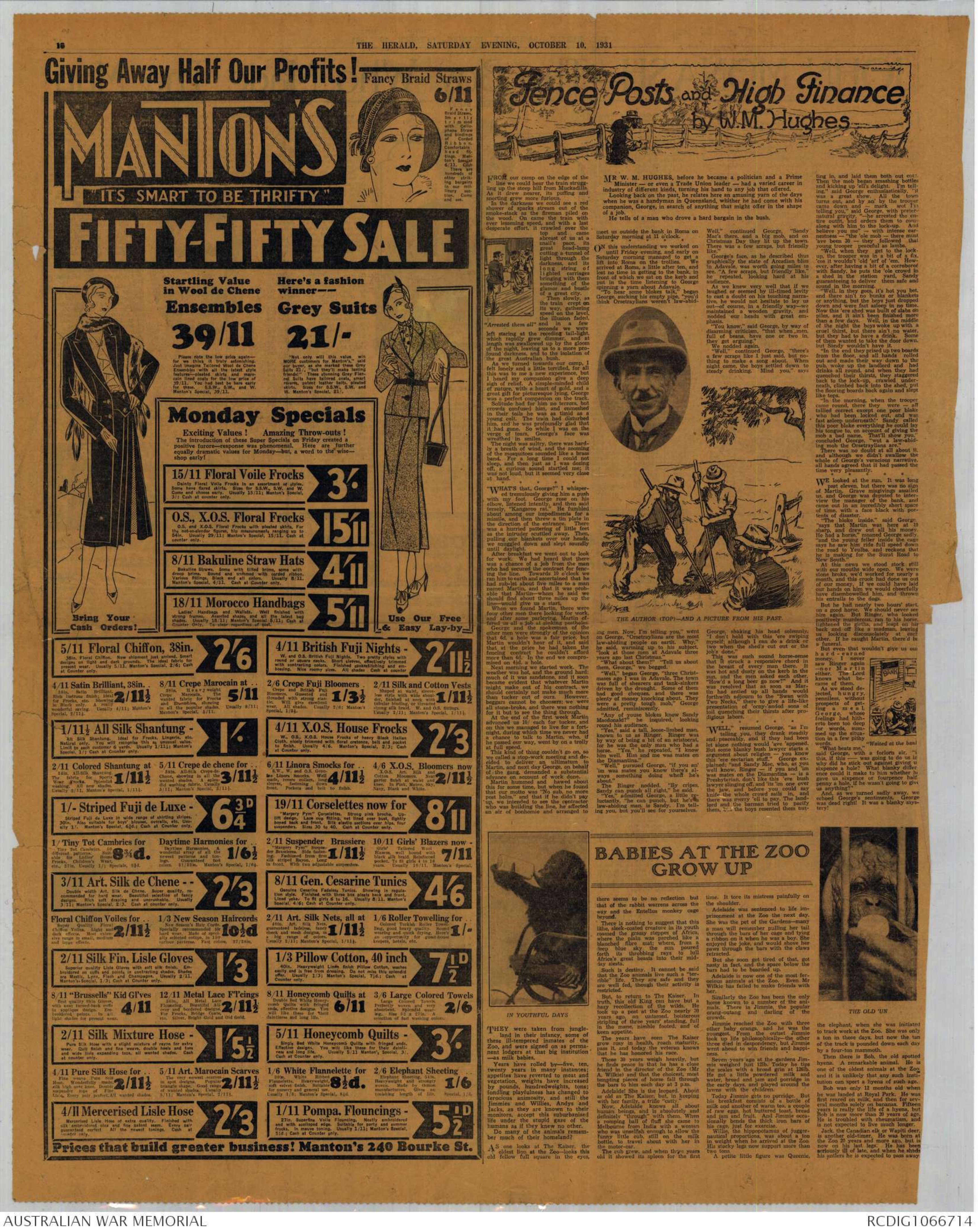
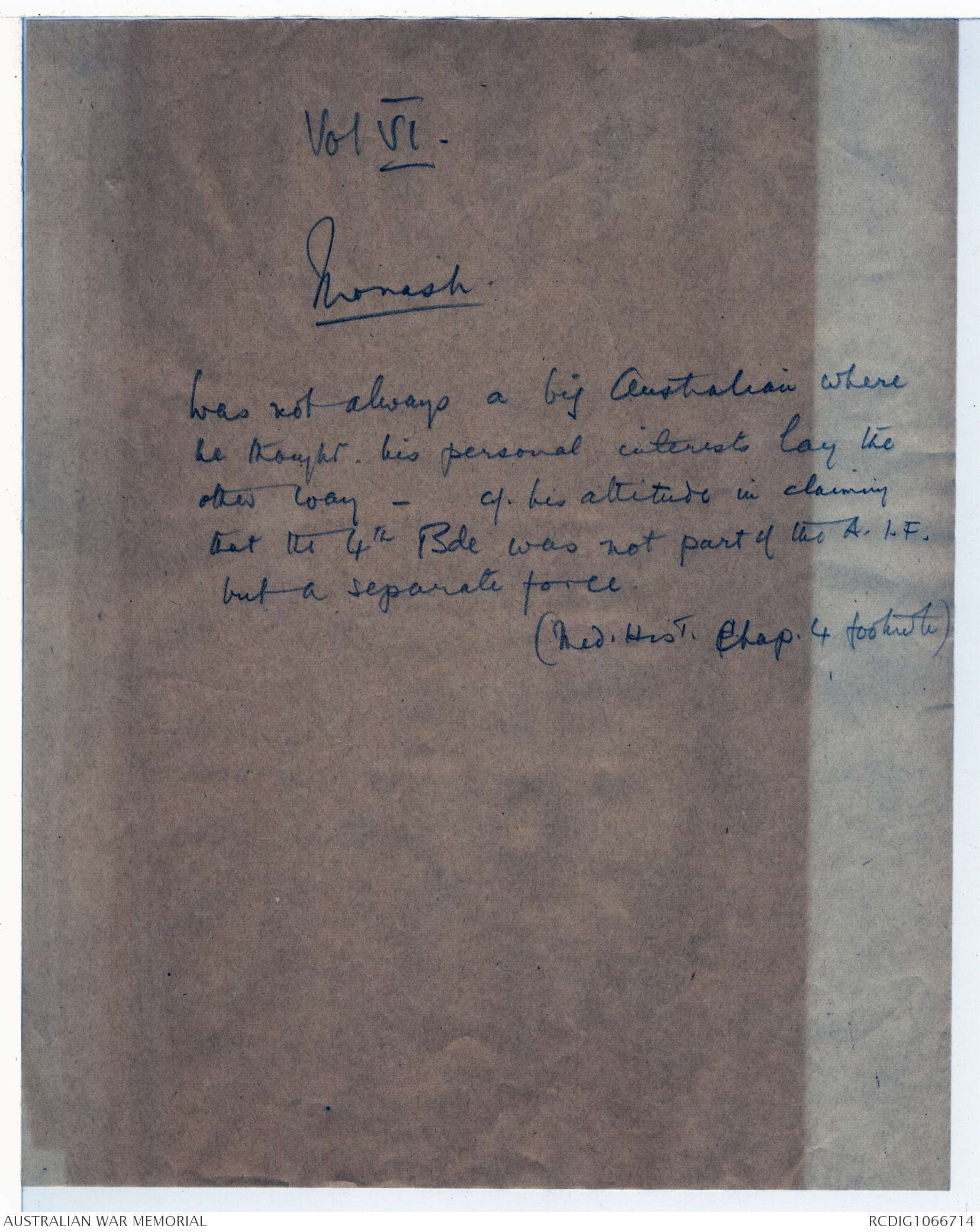
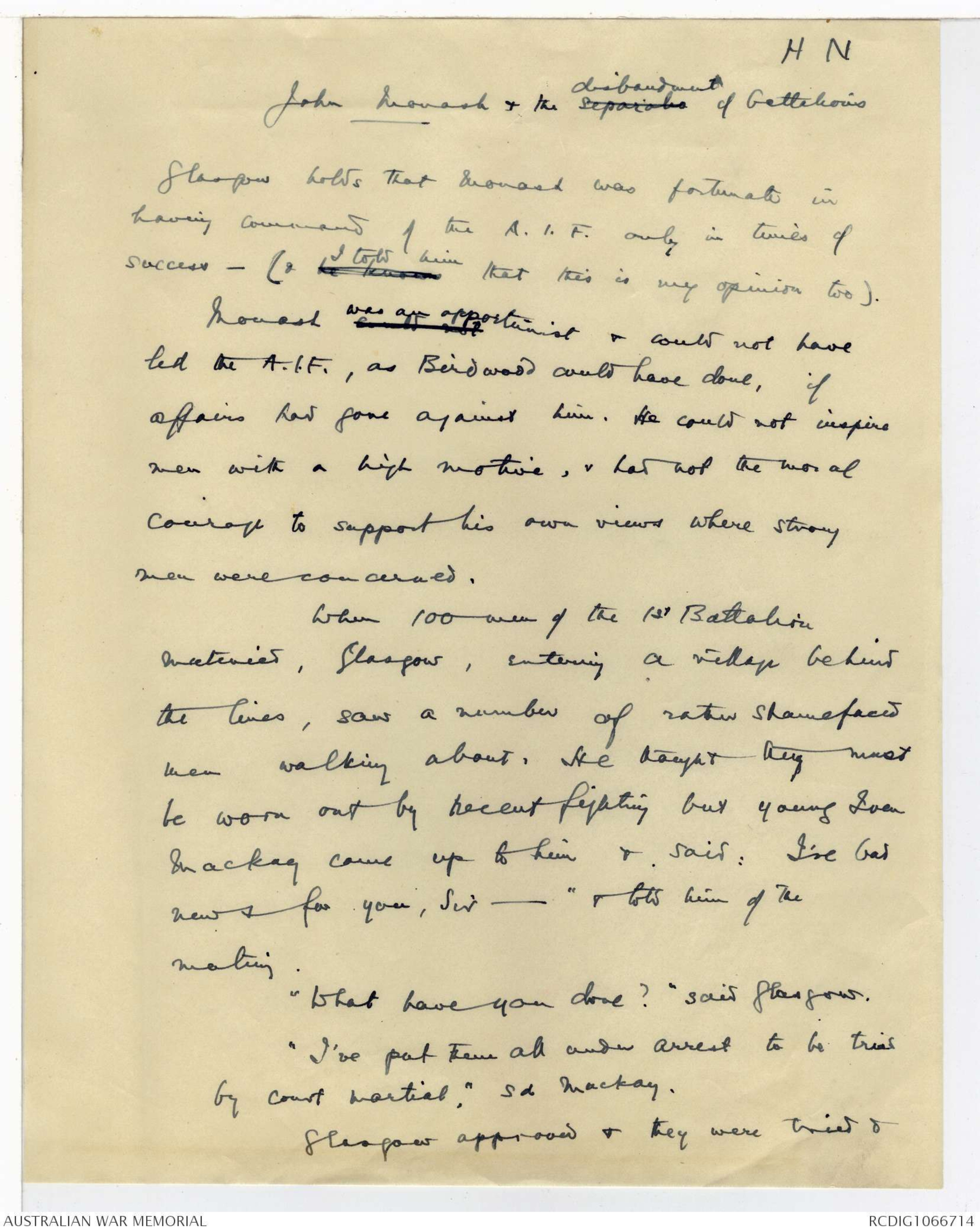
Monash.
Monash could not have tn Haig's place.
He had an exceptionally fine organising
brain, x a great grasp, very wide knowledge
& interests, ^a marvellous power of lucid exposition & a personality wh attached his
staff - closely to all his him. tho he did notHe had / admiration He had / respect of many
of his commanders though there were
striking exceptions (eg. Glasgow and Gellibrand)
But he had little moral courage - he could
not resist political pressure or tt of powerful
intriguers - He had less resistance than Wilson
His ideals were not so high as Birdwoods, & he really
had a lower conception of his men.
[*He was also
never distinguished
by personal
bravery - his
fight for his
great scheme
of electricity
was finer than
any he put up
in / A I.F*]
His military capacity consisted largely mainly
in organising but his conceptions were often
widely wrong. HIs ideals were
His handling of the American division
at / Hindenburg Line - allowing the 27th to
attack w its barrage 800x ahead - was a
gross mismanagement, & was directly responsible
for / loss suffered by / divn & for its failure; but
he immediately tried to throw / blame on the
Americans —(see my diaries) His conception
of / battle merely as "an engineering task" was
completely inadequate, & due to lack of imagination
& appreciation of the human factors - he never really
grasped / mentality of his men.
His greatest feats were Hamel, Aug 8,
(wh of course was Foch's, Haig's, & Rawlinson's
plan in the main details provisions) & Mont St Q - Perrone.
This last was / only one in which there was
any ^special tactical ingenuity. His planning of Proyart (1) was bad .
Bxxx
Monash never utilised the capacity of
his soldiers by planning attacks methods of
attack similar to those o / Germans.
But he did keep them effectively supplied
& administered - & provided all was right
in rear the Austln soldier was then
capable of going through doing / forward work
almost for himself.
Blamey ws probably quite as
clear as White without his personality and
mobility.
If the war had gone on Monash wd have
been up against gt difficulties of discipline, partly
due to his method of flattering the troops; & he
would not have had / morals to face these
difficulties. See Glasgow's account of how
Monash leant on him for dealing with the
mutiny in the 1st Bn - Monash had not /
courage (He wd have gone to London as General
& got White to carry on)
Appointment of Monash. (from Gellibrand 9/1/35).
Gen White. told Gellibrand that Hobbs was one of
those ^seriously considered for promotion to Corps Cdr. But he
was discarded as they Bird felt that he had not
the personality to impress those ^outsiders who dealt with
him. Certainly the Anzac staff, working loyally
as a team, could have "carried" him or Walker,
but Walker apparently was not considered.
Later (when there arose some question as to
Monash's command ^- probably when Hughes was known to be going to consult them -) Glasgow, Gellibrand, &
McLagan & possibly Rosey discussed Monash's
appointment. MacLagan was the only one who possibly
thought him inefficient - That is he thought Monash was
lacking in military knowledge. The others recognised
that at Hamel he had given proof of his capacity -
he was ^Comparatively speaking unknown before; with but was reputed to have
been successful sometimes & unsuccessful at others. They
agreed that no action should be to taken to unseat Monash -
if he lacked in anything the team could pull him through.
White^Birdwood when he^first visited Australia told Gellibrand that golden opinions had
been recorded concerning Monash. [[Coupere?]], who had
Just lately had him under him, had written(? to Rawlinson)
saying that he was the best divisional commander with
whom he had had contact.
Hughes told Gellibrand when they were both in Parliament
that he had practically offered White the Command of the Corps
but White would not take it . (This, of course, xxxxxxx xx xxx
I already knew).
S. M. Herald
6/7/34
6/7/34 LATE GENERAL MONASH.
Commenting on Mr. Lloyd George's reference
in his memoirs to his fruitless wartime search
for a suitable British Commander-in-Chief,
and that "since the war he had been told by
men, whose judgment he valued, that the only
soldier thrown up by the war on the British
side possessing the necessary qualities was a
dominion General," the "Evening Standard"
diarist says: "That soldier was the late General
Monash whose military genius came as
naturally to him as to Napoleon's Generals."
GENERAL MONASH.
Some Sidelights.
(BY NORMAN CAMPBELL.)
A man so various that he seemed to be not one
but all mankind's epitome.
In his informative article on the 'War
Letters of General Monash," R.G.H. says: "When,
after the war, he led 5000 picked men through
London, it must have been truly the most
splendid moment of his career."
Once I asked General Monash that very
question, "What was the proudest moment of
your career?"
He knit his brows for a moment in his
characteristic way, and then said: "I've had
two proud moments which I recall. One
was when I called a council of war just before
we broke the Hindenburg line, the other was
when I had a yarn with Ned Kelly."
[*Miss Monash tells me she knows
nothing of this. Apparently J. Monash
was then in Melbourne & had been
for 2 yrs a long time. She would surely have
heard of it if it were true. C.E.W.B.*]
Of course, I asked for details as to both
events. "I was a school kid at Jerilderie,"
explained Sir John, "when Ned Kelly and his
gang took possession of the township and held
it for three days. That was in February,
1879. Like all the other youngsters in the
place, I was keen to get a glimpse of the
famous outlaw. So I went round in the
morning, rather early, to the hotel which Ned had
made his headquarters, and saw him come
out of the place and squat on the verandah's
edge to have a smoke. He beckoned me
over, asked me my name, and so forth, and
then gave me a short lecture. A Sunday school
superintendent couldn't have given me
better advice as to human conduct.
The council of war I called on the Western
Front on the occasion I have mentioned
was a ticklish business. I wasn't afraid that
I couldn't convince my Australian generals
that I was right but several British generals
were also present. Each one of these was a
professional soldier. Each had been born
into the cast-iron traditions of the British
Army. Each subconsciously felt some disdain
for my views - I, a mere citizen soldier. Well,
I had to convince these men that my plan
was the best possible in the circumstances, and
not only that, but send them away from that
council enthusiastic about it, and eager to
carry it out. I did it," he concluded simply,
"and that, I think, was really the proudest
moment of my life."
THE GALLIPOLI EVACUATION.
I once sat next Sir John at a long and
rather dreary political banquet, and as usual
he chatted freely on all kinds of things. The
subject of the evacuation of Gallipoli came up,
and he told me many details concerning that
masterly operation. "We had strict orders
to leave no scrap of writing - and not even
a newspaper - behind. Well, my party was
almost the last to leave, and, just as we
had got to the embarkation point, I suddenly
remembered that I had left all my private
papers and diary-letters in my dugout, three
miles away. I simply told the others to
'carry on', and dashed back through the night
to retrieve my precious documents. I ran
all the way, got my papers all right, and
then dashed back safely. The point of the
story is that there was not a man between me
and the entire Turkish army."
One pictures the sturdy little figure scudding
through the night! A few days later
I wrote and asked Sir John if he would allow
me to print the story. Here is his reply:
"Thanks for your letter of the 18th inst.,
and for the enclosure from your little niece.
Please tell her that I appreciate her letter
of thanks just as much as she could have
appreciated my autograph.
"Regarding that story I told you about the
night of the evacuation, by all means use it
if it is of interest to you. I should add
that the despatch case which I went back
to find contained not only the whole of the
orders for the evacuation - which we had
been strictly enjoined to destroy after perusal,
but which I had wickedly hung on to as an
historical souvenir - but also contained the
diary-letter to my folk at home, which
contained a detailed account of everything that
had happened in my part of the Anzac
position from the date - some ten days previously
- when senior officers first became aware,
confidentially, that the evacuation was to
take place.
"It would have been very disastrous if
all these documents had fallen into enemy
hands.
"As regards the diary-letter above referred
to, I managed (again against orders) to get
this smuggled into Australia so as to escape
censorship, and subsequently, during 1916,
many copies of same were made and widely
circulated among my acquaintances and
interested strangers.
"I hope that in writing about these matters,
you do not deal too hardly with me for
"disobeying orders.' "
THE KING AND THE AUTOGRAPH
BOOK.
The allusion to a letter from my little
niece recalls another matter of some interest.
I had asked the General for his autograph
for this little girl, and he willingly gave it.
"You know," he said, "I am very fond of
collecting autographs myself. I have a book
containing specimens from every notability
associated with the war - a most catholic
collection. One day in France I was in my
H.Q., and this autograph book was lying
on the table, when the King strolled in.
Casually, he picked up the book and glanced
through it. 'By jove, Monash,' he said,
'you have a wonderful collection here.' 'Yes,
Sir,' says I. Then the King said. 'Do you
mind if I take this?' 'Not at all, Sir, says I,
and his Majesty slipped my precious book
into his overcoat pocket and walked off.
"Some weeks later he strolled in again. 'I've
brought you back your book, Monash,' he
said, and handed it to me. The signature
of every member of the Royal family from
King George down, had been added to my
collection, with a word of good cheer from
each."
When Sir John came back from India,
where he had been representing the
Commonwealth at the Durbar at Delhi, I remarked
to him that he seemed to work harder as
he grew older.
"Yes", he said, "I'm a busy man. Sometimes
I wish I could find time to play with
my toys."
"What are your toys, General?" I asked.
"Standard roses and the piano," he
answered, "I never seem to get time to
practise now."
Not many people knew that he was quite
an accomplished musician.
Monash's Letters.
Now, good people, don't worry
about me or my advancement. For me
it counts for very little. If they
want me to command a division they
know where to find me. So far
nobody has passed over me.
McCay, Chauvel and Legge are all
my seniors. I might have had the
4th Division. Pearce cabled Birdwood
asking that either Brudenell
White or I might get it; but Birdwood
preferred to entrust it to Cox,
a Kitchener man, and an old Indian
colleague of Birdwood's.
My thoroughly successful command
or my own brigade, and my
satisfactory performance of every task set
my brigade is quite good enough for
me, and I know what Cox and Godley
and Birdwood and Commander-in
Chief (Sir Archibald Murray)
think of me and my brigade.
AUSTRALIA'S ABLEST SOLDIER;
Brudenell White, brigadier-general,
was Director of Military Operations
in Australia. He was Bridges's
right-hand man. He was the general staff
officer, first grade, of Bridges's
division. Later on he was chief of the
general staff of Birdwood's Army
Corps. He is far and away the ablest
soldier Australia has every turned out.
He is also a charming good fellow.
Since last writing, the only two
things of interest that have
happened are, firstly, the successful raid
by a portion of our front line here
on an advanced Turkish post, in
which we captured 33 Turks and one
Austrian officer, with the loss of only
one man, and, secondly, the visit
to Serapeum of the Commander-in-Chief
(Sir Archibald Murray).
He came along with his great
retinue of generals and staff, with
Godley and his staff, the Prince of
→his staff. I put up a star turn with
all the brigade at work all over the
↑Wales, now gazetted a captain, with
desert-musketry, bayonet fighting,
grenade fighting (real grenades) and
machine-gun practice galore. The
old Commander-in-Chief was
mightily pleased, and said so.
Newspaper article - see original document
JOHN MONASH - The Boy Who Made The Man
By FELIX MEYER
THE HERALD, SATURDAY EVENING, OCTOBER 10, 1931
Newspaper article - see original document
Fence Posts and High Finance
by W.M. Hughes
THE HERALD, SATURDAY EVENING, OCTOBER 10, 1931
Vol VI.
Monash.
Was not always a big Australian where
he thought. his peronal interests lay the
other way - c/. his attitude in claiming
that the 4th Bde was not part of the A.I.F.
but a separate force.
(Med. Hist. Chap. 4 footnote)
H N
John Monash & the separatio disbandment of battalions
Glasgow holds that Monash was fortunate in
having command of the A.I.F. only in times of
success - (& he knew I told him that this is my opinion too).
Monash could not was an opportunist & could not have
led the A.I.F., as Birdwood could have done, if
affairs had gone against him. He could not inspire
men with a high motive, & had not the moral
courage to support his own views where strong
men were concerned.
When 100 men of the 1st Battalion
mutinied, Glasgow, entering a village behind
the lines, saw a number of rather shamefaced
men walking about. He thought they must
be worn out by recent fighting but young Ivan
Makay came up to him & said: I've bad
news for you, Sir - " & told him of the
mutiny.
"What have you done?" said Glasgow.
"I've put them all under arrest to be tried
by court martial," sd Mackay.
Glasgow approved & they were tried &
 Sam scott
Sam scottThis transcription item is now locked to you for editing. To release the lock either Save your changes or Cancel.
This lock will be automatically released after 60 minutes of inactivity.